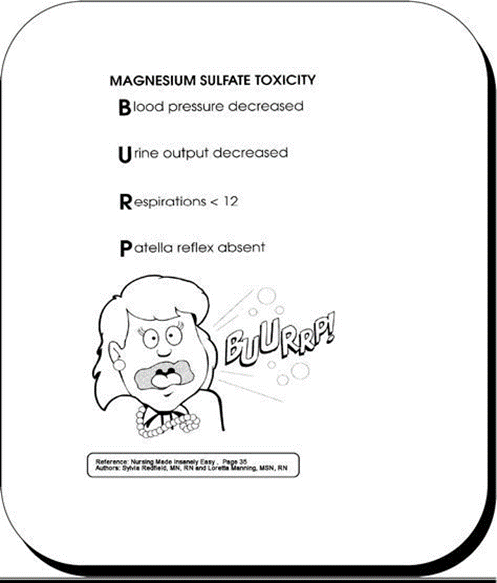A nurse is assessing a client who received magnesium sulfate to treat preterm labor. Which of the following clinical findings should the nurse identify as an indication of toxicity of magnesium sulfate therapy and report to the provider?
Drowsiness
Facial flushing
Nausea
Respiratory depression
The Correct Answer is D
Explanation:
A. Drowsiness: Mild drowsiness is a common side effect of magnesium sulfate therapy and is not necessarily indicative of toxicity. However, severe drowsiness or lethargy can be a sign of magnesium toxicity and should be reported to the provider.
B. Facial flushing: Facial flushing is a common side effect of magnesium sulfate administration and is generally not a sign of toxicity. It is often accompanied by warmth and redness of the skin but is not considered a serious adverse reaction.
C. Nausea: Nausea is another common side effect of magnesium sulfate therapy and is usually mild and transient. It is not typically indicative of toxicity unless it is severe and persistent.
D. Respiratory depression: Respiratory depression is a critical sign of magnesium toxicity. Excessive levels of magnesium can affect neuromuscular function, leading to respiratory muscle weakness and depression. This can result in shallow or slowed breathing, decreased oxygenation, and potential respiratory failure. Respiratory depression is a serious complication that requires immediate intervention, and the nurse should report it to the provider promptly.

Nursing Test Bank
Naxlex Comprehensive Predictor Exams
Related Questions
Correct Answer is A
Explanation
Explanation:
A. Report of headache
Severe preeclampsia is characterized by hypertension (high blood pressure) along with other signs and symptoms of preeclampsia, such as proteinuria (protein in the urine) and end-organ dysfunction. Headache is a common symptom associated with severe preeclampsia and is often described as persistent and severe.
B. Polyuria
Polyuria, or excessive urination, is not typically associated with severe preeclampsia. In fact, decreased urine output (oliguria) can be a concern in severe cases due to reduced kidney function and fluid retention.
C. Tachycardia
Tachycardia, or a rapid heart rate, is not a typical finding in severe preeclampsia. In fact, hypertension and vascular constriction associated with preeclampsia can lead to normal or even lower heart rates in some cases.
D. Absence of clonus
Clonus refers to rhythmic, involuntary muscle contractions and relaxations. In the context of preeclampsia, the presence of clonus (especially hyperreflexia and positive clonus) is a concerning sign associated with central nervous system irritability and potential seizures. Absence of clonus would not be an expected finding in severe preeclampsia, as neurological manifestations such as hyperreflexia and clonus can occur in more severe cases.
Correct Answer is B
Explanation
Explanation:
A. "Don't worry. You will be fine once the baby is born."
This response may inadvertently dismiss the client's feelings of doubt and uncertainty. It assumes that the client's concerns will automatically resolve after childbirth, which may not be the case for everyone. It lacks acknowledgment of the client's current emotional state and does not offer meaningful support or guidance.
B. "Ambivalent feelings are quite common for women early in pregnancy."
This response acknowledges the client's feelings of doubt and uncertainty as valid and common experiences during early pregnancy. It normalizes her emotions, letting her know that she is not alone in feeling this way. By providing this validation, the nurse creates a supportive environment where the client can feel understood and accepted.
C. "Perhaps you should see a counselor to discuss these feelings further."
Suggesting counseling is a proactive and supportive approach. It recognizes that the client's emotions are complex and may benefit from professional guidance. Counseling offers a safe space for the client to explore her feelings, understand their root causes, and develop coping strategies. It demonstrates the nurse's commitment to the client's emotional well-being and encourages seeking help when needed.
D. "Have you spoken to your mother about these feelings?"
While seeking support from family members can be valuable, this response may not fully address the client's emotional needs. It assumes that talking to her mother will automatically resolve her concerns, which may not always be the case. Additionally, some clients may prefer discussing sensitive issues with a neutral third party or a trained counselor who can offer unbiased support and guidance.
Whether you are a student looking to ace your exams or a practicing nurse seeking to enhance your expertise , our nursing education contents will empower you with the confidence and competence to make a difference in the lives of patients and become a respected leader in the healthcare field.
Visit Naxlex, invest in your future and unlock endless possibilities with our unparalleled nursing education contents today
Report Wrong Answer on the Current Question
Do you disagree with the answer? If yes, what is your expected answer? Explain.
Kindly be descriptive with the issue you are facing.
